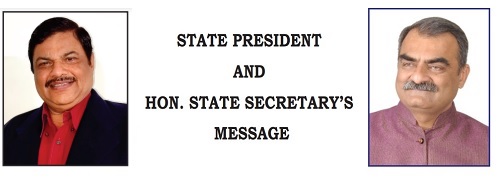March 2023 Issue

Dear IMA GSB Friends,
Seasons’ Greetings. Wishing you Happy Mahavir Jayanti, Hanuman Jayanti & Akha-Trijin advance.
Our small and medium scale hospitals and doctors are facing much troubles in registration/renewal under Hospital/Clinical Establishments Act, Fire Safety, Biomedical Waste Management Act, C-Form etc. We are
in constant liaison with the State Government & concerned Authorities, to find a comfortable & compromised way out. We are quite sure that soon we shall be able to find a middle way in this.
Lessons from COVID 19
We seem to have gone past the worst crisis of our life time, as COVID 19 looks to have peaked out for now. We also realised that this is not the last disaster that we have faced. Our health care system was overwhelmed with massive number of sick patients and our doctors, nurses and other support staff responded bravely, often at the cost of their own safety and lives. This dedication and sense of duty set a great example of how doctors selflessly serve the society. Our Prime Minister and the Government also recognised the role played by our dedicated doctors, who saved so many lives in this worst pandemic of the century.
This pandemic has offered a plenty of lessons for all of us – individual medical practioners, doctors practising in public and private hospitals and also those, managing our public, private and corporate hospitals. Some of them are as follows: Be ready with plans for sudden increase in demand for health care services: We encounter small and large, either man made or natural disasters regularly and it is very critical that we have plans in place as to how should we deal with such exceptional situations. We should also review such plans periodically and undertake mock drills on regular basis. That will strengthen our capabilities to respond to such disasters and make our health systems more resilient.
Use of Technology: One important lesson that comes out prominently, from our COVID 19 response, is the use of technology during the epidemic. Use of telemedicine was very extensive during those days and despite some limitations, tele-consult has become one of the most acceptable way to offer advice and consultation for medical practitioners. Technology was also used widely for other uses during pandemic and we all stand to benefit from that. There are a number of such success stories where health care services and systems used technology,
internet based services, e commerce plaforms and even the delivery of critical medical supplies and vaccines through drones. Our COWIN plaform used for vaccination has become a very successful technology and this plaform was offered to so many other countries by India.
Ensure robust supply chain: We realised that there was shortage of critical devices like lifesaving drugs and devices from time to time. Even oxygen also came at premium. Some medicines just disappeared from the market. Similar situation was seen in supplies of masks, other disposable items and medical devices. To address such massive unexpectedly high demands of medical supplies, we should diversify our supply chain and sources, from where we procure our medical goods. This particular problem was just not only local but this agenda has also caught global
attention. Now so many countries want to reduce their dependence on outside suppliers. India is also taking multiple steps in this direction by encouraging indigenous manufacturing of bio pharmaceuticals and medical devices.
Strengthen our Surveillance and data collection systems: This will help us anticipate such disasters much earlier before the situation escalates. With early notification our response will be robust and timely. This will help us to develop a stronger medical response, implement preventive measures and even hasten our vaccine development effort, in time to contain the damaging consequences of such an epidemic.
Emotional Support to health care staff: Welost of a lot of our colleagues in this pandemic. Stress levels ran very high amongst doctors, paramedical professionals and even their families. Some of our colleagues had to work days and days continuously, without any break. Conversely, some of colleagues and specialists were not able to practice for months and suffered massive loss of income. All these situations require a lot of emotional and psychological support to our colleagues who suffer from such problems. Mental health is often a neglected area, even amongst the doctors!
The best way to pay tribute to our doctor colleagues, we lost to COVID-19, would be by learning from the experience and implement those lessons that could help our patients and save their lives. I believe that the some of the lessons we have learned from the pandemic, would also improve the hospital care and health care delivery in both – our daily practice and would also help us to better prepare ourselves for future such pandemics.
IMA, Jay Jay Garvi Gujarat, Jay Hind.
For more information download bulletin PDF








